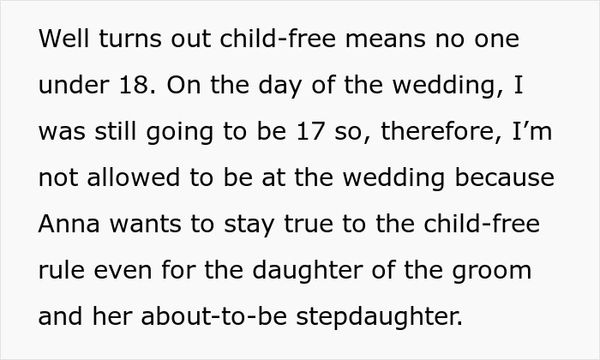
Weddings are special occasions that should be filled with magic and love for all involved. Whether you’re the one saying “I do” or a cherished guest, it’s a time to come together and celebrate the commitment of two souls. However, sometimes decisions are made that can unintentionally exclude certain individuals, like what happened to a teenager who was planning to attend her father’s wedding.
The happy couple decided at the last minute that the wedding would be “child-free,” meaning no one under 18 would be welcome. This unexpected change left the teenager feeling disappointed and excluded. In response, she took to social media to share her feelings about being uninvited from her own father’s wedding.
Child-free weddings have been growing in popularity in recent years. Many couples opt for this type of celebration to ensure that the focus remains on the adult guests and their enjoyment of the event. Some reasons for choosing a child-free wedding include avoiding the potential disruption of crying or misbehaving kids, allowing parents to have a night off from their parenting responsibilities, and creating a space where guests can truly be present without the distractions of little ones.
To learn more about child-free weddings, we spoke to wedding expert and Editor at Bespoke Bride, Jhona Yellin. Jhona explained that hosting a child-free celebration has become a trend that symbolizes sophistication and elegance. It’s like curating a fine wine list, creating an ambiance that’s meant for mature palates. By keeping the celebration adults-only, couples can ensure that the dance floor remains a whirlwind of tango and twirls rather than a playground for tiny terrors.
However, not everyone is on board with the idea of a child-free wedding. According to a UK survey, one-quarter of people believe that all wedding guests should be able to bring their children along. Brides and grooms who choose to have a child-free wedding often face immediate backlash from guests, with some even severing ties with the couple. It’s a decision that can create friction and hurt feelings among loved ones.
Despite the growing popularity of child-free weddings, there are ways to involve children in the celebration without compromising the intended ambiance. Jhona suggests a tailored approach for teenagers, who often have their own unique way of navigating social situations. For example, hosting a pre-wedding “Teen Lounge” filled with gadgets and goodies can captivate their tech-savvy hearts and keep them engaged throughout the event.
For younger children, Jhona recommends involving them in the wedding planning process. Let them be your tiny consultants and seek their advice on decor, outfits, and even dance moves. Having them present a heartwarming reading during the ceremony or finding other age-appropriate ways to include them can create beautiful memories for everyone involved. The key is to strike a balance between involvement and ensuring that children are not overwhelmed.
Weddings should be joyful occasions where everyone feels included and celebrated. Whether it’s a child-free celebration or one that involves little ones, the focus should always be on creating a magical experience for all. By understanding and respecting each other’s choices, we can ensure that weddings remain a cherished tradition filled with love and happiness.



